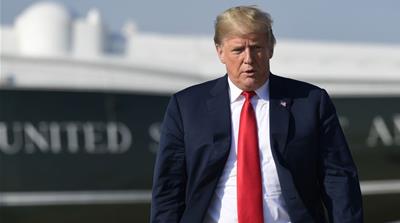Profile: Who is Andrew Brunson, the US pastor detained in Turkey?
Andrew Brunson, an American pastor, at the heart of a diplomatic crisis between Turkey and the US has appeared in a court in Izmir city.
The 50-year-old evangelical preacher was imprisoned in October 2016, following a failed coup attempt in July that claimed more than 250 lives and wounded nearly 2,000 people.
Turkey blamed Fethullah Gulen, a former ally of Turkish President Recep Tayyip Erdogan, for the failed coup. Gulen now now lives in the US on a self-imposed exile.
Brunson was detained for 24 months, charged with ‘terrorism’ by the Turkish government for alleged links to Gulen’s organisation and attempts to convert Kurds to Christianity to sow discord in Turkey, according to his indictment.
He had been under house arrest since July.
The preacher originally from North Carolina has lived in Turkey for two decades. He is the pastor of the Izmir Resurrection Church, a small congregation of about 25 people.
Brunson and his wife raised three children in Izmir, a Turkish city on the Aegean coast, according to The Economist.
His children have been educated in Turkish schools and two of them were born in the country, according to the European Centre for Law and Justice, which has advocated for the pastor’s release.
The Izmir Resurrection Church belongs to the Evangelical Presbyterian Church, an ideologically centrist group within “Presbyterianism’s liberal-conservative spectrum”, The Economist wrote.
Diplomatic downturn
The US preacher’s detention adversely affected US-Turkey relations, triggering sanctions and tariffs against Ankara.
US President Donald Trump, who has called for the pastor’s release said a “great patriot” was being held “hostage”.
The diplomatic spat put increased pressure on the Turkish economy, decreasing the value of Turkey’s currency, the lira.
Turkey is an important ally to both the US and the European Union. Ankara plays a strong role in the Middle East, including mitigating the refugee crisis and putting pressure on the government of President Bashar al-Assad in Syria.
 |
| Trump has said that relations between the US and Turkey are “not good at this time!” [Susan Walsh/AP Photo] |
“Look, the Turkish government made a big mistake in not releasing Pastor Brunson,” US National Security Adviser John Bolton told the Reuters news agency in an interview during a visit to Israel.
“Every day that goes by that mistake continues, this crisis could be over instantly if they did the right thing as a NATO ally, part of the West, and release pastor Brunson without condition.”
Evangelical pull
Brunson’s case has become a rallying cry for US evangelicals, a powerful segment of Trump’s support base.
Vice President Mike Pence, himself an evangelical, said “Brunson is an innocent man, there is no credible evidence against him,” in July, before threatening “significant sanctions on Turkey.
John Fea, professor at Messiah College and author of “Believe Me: The Evangelical Road to Donald Trump”, told Turkish agency Ahval that “Religious liberty was one of Trump’s most important campaign promises to American evangelicals. Every time he and Mike Pence weigh-in on the Brunson case they score points with this part of his political base”.
According to Turkish state media TRT World, Christian lobbyists in Washington, DC, have pushed Brunson’s case among legislators and recommended sanctions against Ankara.
Rule of law
Turkish leaders repeatedly rejected US calls for Brunson’s release.
“Attempting to force my government to intervene in the judicial process is not in line with our constitution or our shared democratic values”, Erdogan warned in a New York Times opinion piece published in August.
On Wednesday, Erdogan repeated this sentiment. “I am not in a position to intervene with the judiciary since Turkey is a constitutional state,” he told reporters on Wednesday on a flight back to Turkey.
Brunson’s imprisonment also prompted accusations that minority religions in Turkey were under ‘pressure’ from the government that inhibited the practice of their faiths.
Leaders of every minority faith, including figureheads of Turkey’s Christian community, however, signed a joint declaration in July that denied government interference in the practice of their faiths.




